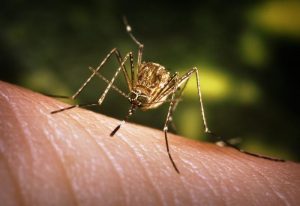NewsDesk @bactiman63
The Florida Department of Health in Hillsborough County (DOH-Hillsborough) reports recently a locally acquired human case of West Nile Virus (WNV).
In response, DOH-Hillsborough and Hillsborough County Mosquito control are collaboratively responding through prevention, mosquito population control, and surveillance efforts.

In 2022, Florida has reported five human WNV cases–Volusia (2), Sarasota, Hillsborough and St. Johns counties.
DOH-Hillsborough reminds residents and visitors to take basic precautions to limit exposure, in order
to mitigate the risk of being bitten.
To protect yourself from mosquitoes, you should remember to “Drain and Cover.”
Drain standing water to stop mosquitoes from multiplying.
• Drain water from garbage cans, house gutters, buckets, pool covers, coolers, toys, flowerpots or
any other containers where sprinkler or rainwater has collected.
• Discard old tires, bottles, pots, broken appliances and other items not being used.
• Empty and clean birdbaths and pets’ water bowls at least twice a week.
• Protect boats and vehicles from rain with tarps that do not accumulate water.
• Maintain swimming pools in good condition and chlorinated. Empty plastic swimming pools
when not in use.
Cover skin with clothing or repellent.
• Clothing – Wear shoes, socks, and long pants and long-sleeves. This type of protection may be
necessary for people who must work in areas where mosquitoes are present.
• Repellent – Apply mosquito repellent to bare skin and clothing.
◦ Always use repellents according to the label. Repellents with DEET, picaridin, oil of lemon
eucalyptus, para-menthane-diol, 2-undecanone and IR3535 are effective.
◦ Use mosquito netting to protect children younger than 2 months old.
• Check and repair screens on doors and windows. Keep them closed and use air conditioning
when possible.
• Make sure window screens are in good repair to reduce the chance of mosquitoes indoors.
Tips on Repellent Use
• Apply insect repellent that contains DEET (10-30%), picaridin, oil of lemon eucalyptus, paramenthane-diol, 2-undecanone or IR3535.
• Treat clothing and gear with products containing 0.5%. Do not apply permethrin directly to skin.
Some sports clothing and gear come pretreated with permethrin.
• Use insect repellent approved by the Environmental Protection Agency (EPA) on exposed skin
and clothing. EPA’s helpful search tool can help you find the product that best suits your needs.
• Follow instructions on the product label, especially if you’re applying it to children.
• Apply insect repellent to exposed skin, or onto clothing, but not under clothing.
• Always follow instructions when applying insect repellent to children and do not use repellents
with DEET on babies younger than 2 months or oil of lemon eucalyptus on children under 3
years old.
• Avoid applying repellents to the hands of children. Adults should apply repellent first to their own
hands and then transfer it to the child’s skin and clothing.
About 1 in 5 people who are infected, develop a fever with other symptoms such as headache, body aches, joint pains, vomiting, diarrhea, or rash. Most people with febrile illness due to West Nile virus
recover completely, but fatigue and weakness can last for weeks or months.
While most cases are mild, about 1 in 150 people may develop a severe illness affecting the central
nervous system such as encephalitis (inflammation of the brain) or meningitis (inflammation of the
membranes that surround the brain and spinal cord).
- Panama records two additional hantavirus cases in Los Santos
- South Africa measles outbreak tops 200 cases
- Anthrax cases reported in Cagayan: Philippines media
- South Korea reports 1st Naegleria fowleri case in man returning from Thailand
- Venezuela: Histoplasmosis outbreak linked to Las Tejerías avalanche
- Minnesota: Legionnaires’ disease cases reported in Duluth
- Vietnam: Dengue cases top 350,000, 50 leprosy cases reported in 2022
- Invasive group A strep cases up in Denver, CDC issues health advisory

